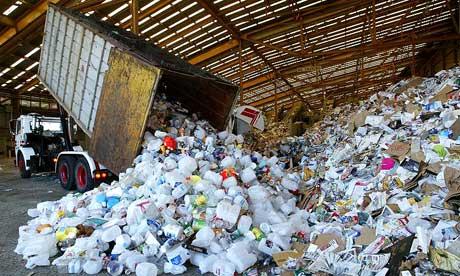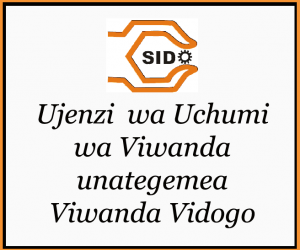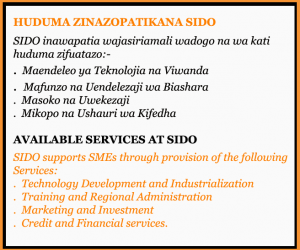
Introduction
Waste recycling refers to the practice of adding value to used material by re-styling, refurbishment and renewal to a position of saleable products.
Waste materials can be processed using appropriate technologies to manufacture different useful products, thus converting wastes to wealth!
Programme concept.
Successful collection of waste requires the arrangement that is able to transfer waste from generator of waste and send to industries toundergo industrial processes necessary to convertthe waste into useful raw material for manufacturing of new products.
The programme objectives.
The overall objective of this programme is to promote economic growth and poverty alleviation by generation of wealth and employment through enterprises creation in environment management and waste recycling industry. The specific objective includes:
To assist and support entrepreneurs to develop sustainable waste recycling businesses by providing the required business development services.
To cooperate with R & D institution to develop/improve technologies needed by, waste recycling enterprises.
To liaise with other stakeholders such as Local Government, NEMC, Donor community NGOs, CBOs and Private Sector to develop programs and schemes that facilitate and support waste recycling initiatives in the country.
To assist in marketing and creating marketing linkages for products manufactured by recycling industries
The target Group
This programme will target it support to the following groups:
(i) Unemployed youths and women in towns and cities.
(ii) Business starters and existing SMEs.
(iii) Gender and sect oral groups of associations.
(iv) Small scale industries
Role ofSIDO
SIDO will work to facilitate the promotion, establishment and development of waste recycling enterprises.It will identify, and facilitate the formation of association of scavenger groups and offer training to strengthen their collective capacities. It will provide support in searching for technology appropriate for recycling industry, and other business support services such as business plan preparation, market and market linkages, working premises, technical advice etc. SIDO will collaborate with local governments and other stakeholders to archive the objectives.
Specifically SIDO will;
1. Assist scavengers and waste collectors to form association and liaise with umbrella Association like VIBINDO and the local government to acquire right of collection andScavenging domain.
2. Work with local government and recycling industries in offering training to collectors andScavengers on waste identification, sorting and grading.
3. Conduct research on different types of waste with a view of coming up with innovative Proposals on possible project and products..
4. To offer necessary business development services i.e.Entrepreneurship and business management trainings Loan for equipment. Linkage to markets and finance.Awareness creation training in collaboration with the municipal government.
The Focus
The proposed waste-recycling programme will focus on Wood (22%) paper (8%) and plastics (5%) in phase one. The three types are selected because of their dominance in generated waste and the products made from them have big market potential. Kitchen and metal waste will be included in phase two depending on success of the recycling of those proposed in phase one.
However because of the problem of littering and blockage of industrial infrastructure that the waste plastic material causes in the cities waste plastic recycling is given priority at the moment. The program will sequentially focus in phases as follows (i) plastics, (ii) wood, (iii) paper and (iv) metal waste.
SIDO in collaboration with local governments will facilitate and promote the establishment of small and medium industrial enterprise on: waste collection, cleaning and sorting and extrusion. . Waste collection, sorting and cleaning can be done at the micro level (Individuals, Groups or groups of scavengers etc).
Small scale industries in waste recycling will be prioritized in support in this program
At the Moment groups of scavengers are being supported in providing training loans and establishment of buy back centers
The stakeholders.
Recycling Programme is a muti-sectoral programme that involves various stakeholders, i.e.
1. Local Governments.
It is expected the Local governments will be responsible to put in place processes, mechanisms and procedures that will ensure a proper and sustainable disposal and sorting of wastes. They will have to develop and implement in collaboration with other stakeholders, programme for awareness creation to impart new attitudes and habits that encourage organized disposal and sorting of wastes. Provision of working premises will be vested to local government.
2. Industrial Support and Research Organizations.
Research institutions and industrial support organization are expected to play a role of assisting SMEs to search and develop new products and waste recycling technologies and processes to improve SMEs competitiveness in recycling industry.
3. Non- Government and community based organization.
These are organizations that usually work at the grass root level. Their role will be to create awareness to people on the best practice of disposal and sorting of wastes.
4. Private Sector.
The private sector, through formation of SMEs will take a lead in establishing waste recycling industries.
5. Financial institutions and commercial banks
Financial institutions are expected tol take part in providing funds through their financing schemes after receiving bankable investment proposals from SMEs interested in investing in recycling industries
6. Donors
Donors in this programme will be requested to: -
i)Support studies related to establishment of recycling industries in the country
ii)Support awareness creation programme geared to change attitudes and habitsAmong the community regarding proper and organized disposal and sorting of waste Materials.
iii) Support capacity building of entrepreneurs and facilitators the programme through Exposure visits, attachment to recycling enterprises and technology transfer arrangements
Region:
Dar es salaam


